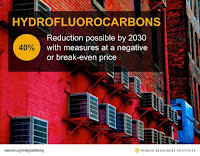Diplomats meeting in Vienna this week hope to take a major step toward a deal under the Montreal Protocol to decrease the use of a potent greenhouse gas, in what could be the most significant measure to combat global warming since last year's Paris climate agreement.
Officials from nearly 200 countries are trying to hammer out details of an agreement to cut the use of hydrofluorocarbons (HFCs) used in heating and air conditioning by amending the ozone-protection treaty that went into force in 1989.
The goal for the Vienna meeting is to agree on schedules for countries to reduce HFC use and on financial support for developing nations cutting their use before a final summit in Kigali, Rwanda in October.
Environmental Protection Agency Administrator Gina McCarthy, who is leading the U.S. delegation, said a phase-down would be a "really big deal" in the global fight against climate change.
We are seeing tremendous projections in the growth in the use of HFCs, especially in developing countries" McCarthy said in an interview.
A deal to replace HFCs with more climate-friendly alternatives "could avoid a rise of 0.5 degree Celsius by the end of the century," said McCarthy.
This would keep countries on track to meet the goal agreed at the Paris climate summit in December to limit the global temperature rise to well below 2 degrees C.
HFCs are used in air conditioning and refrigeration as a substitute for ozone-depleting chlorofluorocarbons, whose use was eliminated under the Montreal Protocol.
But it turned out that HFC emissions are nearly three times as potent as the world’s current annual output of carbon dioxide between now and 2050, according to David Doniger of the Natural Resources Defense Council.
This has raised the urgency to cut them.
"Almost every country here (in Vienna) seems to be working under the premise that we are going to work out an agreement this year," said Doniger.
Countries like Saudi Arabia, which have previously blocked progress, are showing signs of cooperation, he said.
Industry groups have also welcomed the progress because it would give companies time to advance research on new equipment that uses the latest refrigerant replacements for HFCs.
Read more at Vienna Climate Meeting Aims for Progress on Deal to Cut HFC Use

No comments:
Post a Comment